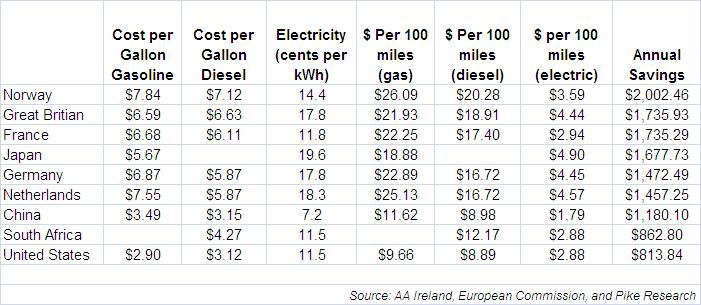Auto industry analysts get paid to issue reports, and most of them are vastly better at data analysis and number crunching than we'll ever be.
That doesn't mean, however, that sometimes their data isn't misleading. It's important to keep context in mind, and not miss the forest for the trees.
What's got us thinking this way is a blog post from Pike Research, which neatly analyzed how much money average consumers in different countries could save by driving a plug-in vehicle versus a gasoline one.
Their data puts the poor old U.S. consumer pretty much at the bottom of the heap.
Buyers in European countries that tax gasoline heavily save far more ($2,000 in Norway, $1,735 in Great Britain and France) than U.S. buyers ($813), even though we're replacing far less fuel-efficient vehicles. Only South Africans save as little as we do.

Cost comparison of driving electric versus on gasoline in different countries, from Pike Research
Pike notes that it believes "sales of EVs will grow relatively quickly," but that plug-in sales would probably grow faster if the U.S. didn't have such cheap gasoline (relative to other countries).
The missing context, though, is that U.S. buyers of plug-ins like the 2011 Chevrolet Volt and 2011 Nissan Leaf most likely won't make their decision because they'll save money over the course of their ownership.
Gasoline is cheap--as Pike points out--and for many years, electric cars will largely be bought by wealthier consumers who don't need the marginal savings.
If we use the past decade of hybrid-electric vehicle sales in the U.S. as a model, the decision to buy a car with high fuel efficiency often has little or nothing to do with saving money for most buyers.
Instead, a survey showed, most Toyota Prius buyers did so not because they wanted to save money, but because they wanted to make a statement about what kind of a person they were.
So U.S. buyers won't save as much money driving on grid power as Norwegians. Big deal. It's true, but it's also irrelevant to the sales prospects for electric vehicles in this country until at least 2015 or thereafter.
Trees, meet forest.













